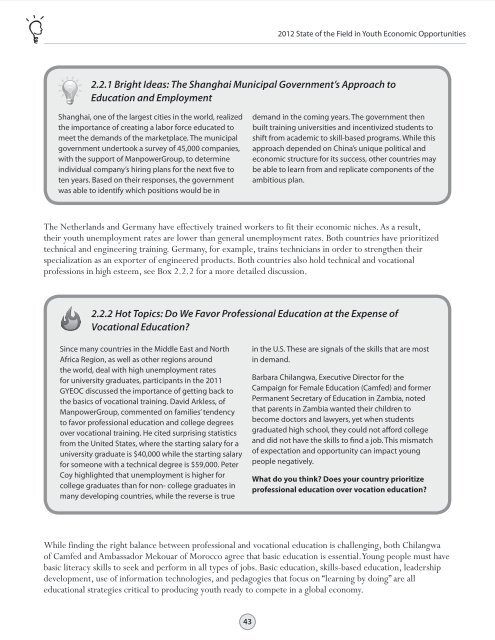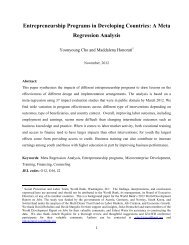STATE OF THE FIELD IN YOUTH ECONOMIC OPPORTUNITIES
STATE OF THE FIELD IN YOUTH ECONOMIC OPPORTUNITIES
STATE OF THE FIELD IN YOUTH ECONOMIC OPPORTUNITIES
You also want an ePaper? Increase the reach of your titles
YUMPU automatically turns print PDFs into web optimized ePapers that Google loves.
Table of Contents<br />
Chapter 1 Chapter 2 Chapter 3 Chapter 4 Chapter 5 Chapter 6 Chapter 7 Chapter 8<br />
Chapter 9<br />
Chapter 10 Chapter 11 Chapter 12 Chapter 13 Chapter 14 Chapter 15 Annexes<br />
2012 State of the Field in Youth Economic Opportunities<br />
2.2.1 Bright Ideas: The Shanghai Municipal Government’s Approach to<br />
Education and Employment<br />
Shanghai, one of the largest cities in the world, realized<br />
the importance of creating a labor force educated to<br />
meet the demands of the marketplace. The municipal<br />
government undertook a survey of 45,000 companies,<br />
with the support of ManpowerGroup, to determine<br />
individual company’s hiring plans for the next five to<br />
ten years. Based on their responses, the government<br />
was able to identify which positions would be in<br />
demand in the coming years. The government then<br />
built training universities and incentivized students to<br />
shift from academic to skill-based programs. While this<br />
approach depended on China’s unique political and<br />
economic structure for its success, other countries may<br />
be able to learn from and replicate components of the<br />
ambitious plan.<br />
The Netherlands and Germany have effectively trained workers to fit their economic niches. As a result,<br />
their youth unemployment rates are lower than general unemployment rates. Both countries have prioritized<br />
technical and engineering training. Germany, for example, trains technicians in order to strengthen their<br />
specialization as an exporter of engineered products. Both countries also hold technical and vocational<br />
professions in high esteem, see Box 2.2.2 for a more detailed discussion.<br />
2.2.2 Hot Topics: Do We Favor Professional Education at the Expense of<br />
Vocational Education<br />
Since many countries in the Middle East and North<br />
Africa Region, as well as other regions around<br />
the world, deal with high unemployment rates<br />
for university graduates, participants in the 2011<br />
GYEOC discussed the importance of getting back to<br />
the basics of vocational training. David Arkless, of<br />
ManpowerGroup, commented on families’ tendency<br />
to favor professional education and college degrees<br />
over vocational training. He cited surprising statistics<br />
from the United States, where the starting salary for a<br />
university graduate is $40,000 while the starting salary<br />
for someone with a technical degree is $59,000. Peter<br />
Coy highlighted that unemployment is higher for<br />
college graduates than for non- college graduates in<br />
many developing countries, while the reverse is true<br />
in the U.S. These are signals of the skills that are most<br />
in demand.<br />
Barbara Chilangwa, Executive Director for the<br />
Campaign for Female Education (Camfed) and former<br />
Permanent Secretary of Education in Zambia, noted<br />
that parents in Zambia wanted their children to<br />
become doctors and lawyers, yet when students<br />
graduated high school, they could not afford college<br />
and did not have the skills to find a job. This mismatch<br />
of expectation and opportunity can impact young<br />
people negatively.<br />
What do you think Does your country prioritize<br />
professional education over vocation education<br />
While finding the right balance between professional and vocational education is challenging, both Chilangwa<br />
of Camfed and Ambassador Mekouar of Morocco agree that basic education is essential. Young people must have<br />
basic literacy skills to seek and perform in all types of jobs. Basic education, skills-based education, leadership<br />
development, use of information technologies, and pedagogies that focus on “learning by doing” are all<br />
educational strategies critical to producing youth ready to compete in a global economy.<br />
43

















